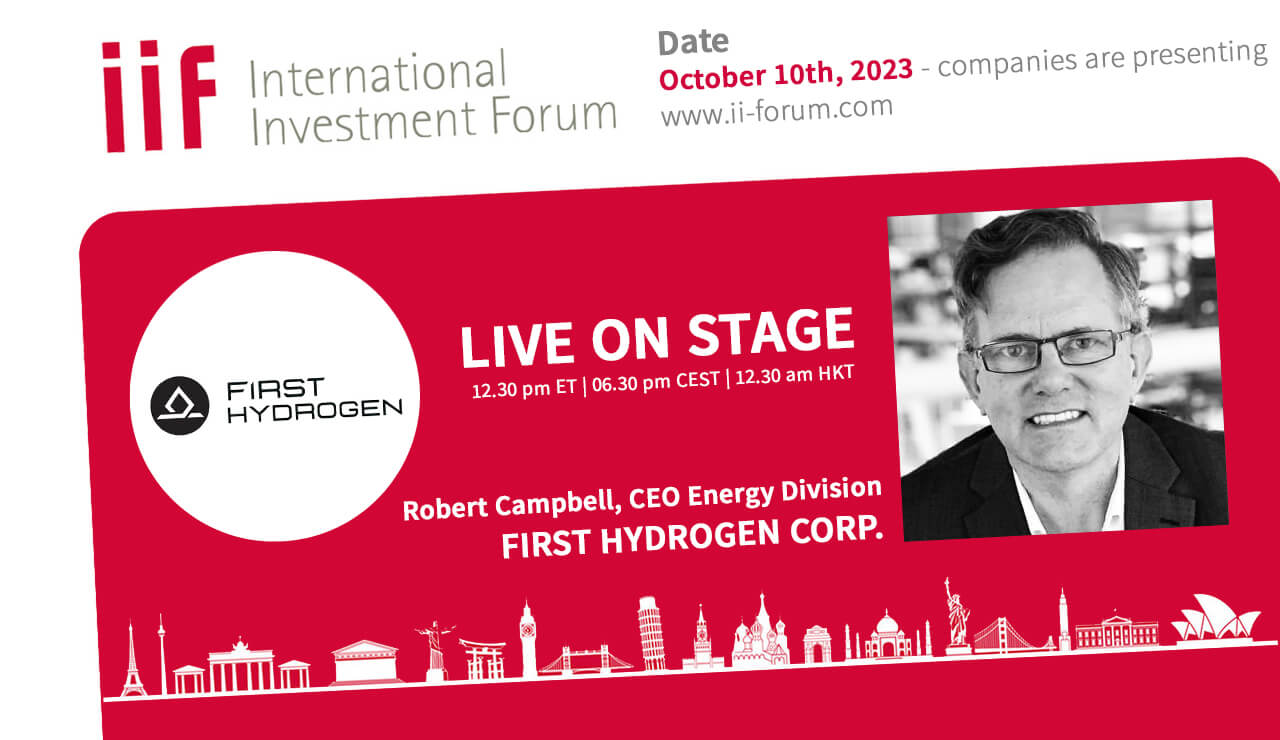September 28th, 2023 | 09:20 CEST
First Hydrogen, Siemens Energy, PayPal - Innovative growth with hydrogen and its own currency
Global Market Insights forecasts that the parcel delivery vehicle market is expected to reach over USD 210 billion by 2032, driven by the uninterrupted growth of e-commerce. First Hydrogen is a company specializing in sustainable propulsion solutions for such fleet vehicles. Hydrogen-powered vehicles are also currently finding their way onto the streets of India. India is the world's fifth-largest economy and is sending a crucial signal with hydrogen technology. First Hydrogen has positioned itself in a promising market. Siemens Energy is also betting on hydrogen. After the debacle caused by the takeover of the wind energy company Siemens Gamesa, the hydrogen deal with Air Liquide is finally leading to an increase in the share price. At PayPal, the new CEO is a breath of fresh air. The Company is expanding its growth potential in the direction of its own cryptocurrency. Find out what that means for investors here.
time to read: 5 minutes
|
Author:
Juliane Zielonka
ISIN:
First Hydrogen Corp. | CA32057N1042 , SIEMENS ENERGY AG NA O.N. | DE000ENER6Y0 , PAYPAL HDGS INC.DL-_0001 | US70450Y1038
Table of contents:

"[...] Why should a modular electrolyzer cost more than a motorcycle? [...]" Sebastian-Justus Schmidt, CEO and Founder, Enapter AG
Author
Juliane Zielonka
Born in Bielefeld, she studied German, English and psychology. The emergence of the Internet in the early '90s led her from university to training in graphic design and marketing communications. After years of agency work in corporate branding, she switched to publishing and learned her editorial craft at Hubert Burda Media.
Tag cloud
Shares cloud
First Hydrogen - Positive study results for hydrogen use in logistics companies
In a significant step towards sustainable mobility, India will unveil its first hydrogen-powered fuel cell bus on September 25 as part of a test trial. The hydrogen-powered bus thus points the way for India on its way to environmentally friendly and independent economic solutions.
IndianOil, owned by India's Ministry of Petroleum and Natural Gas, is thus launching a comprehensive program of 15 fuel-cell buses powered by green hydrogen. The tests are taking place on selected routes in Delhi, Haryana and Uttar Pradesh.
Meanwhile, in the UK, the first results are available from a trial undertaken by Canadian company First Hydrogen together with the UK fleet operator Rivus. This trial analyzes the performance of hydrogen-powered vans compared to electric battery-powered vans. Pure electric mobility has some weaknesses in the commercial vehicle industry. For example, battery-powered designs are often too heavy, and the range gained from a charge is too short to make it cost-effective to use in logistics.
Rivus' report provides an objective initial assessment of their experience with First Hydrogen's FCEV. The UK-based fleet management provider concluded in its report: "Overall, the First Hydrogen vehicle performed very well during the trials and appears to be much more robust than a BEV in terms of how various load factors affect vehicle efficiency."
The trial deliberately simulated the situation that logistics vans go through on a daily basis. Numerous starts and stops at various delivery points and varying load capacities due to decreasing cargo. First Hydrogen's vehicles were initially designed for long distances but are equipped with hybrid powertrains (hydrogen fuel cell and battery) better suited for short trips in urban areas. The First Hydrogen vehicle's regenerative braking recharges the battery, especially during frequent starts and stops, such as those found in densely populated areas and on routes with many stops. This is especially important for delivery vehicles, where drivers may make more than 100 stops a day. The study proves that hydrogen vehicles in the commercial vehicle industry are more robust and better suited for logistics.
Another plus is that it takes about 5 minutes to refuel First Hydrogen's FCEV with hydrogen, as opposed to about 5 hours to charge a comparable electric vehicle. As a result, the vehicles can be used for longer and offer fleet operators more flexibility. Those interested in learning more about First Hydrogen's roadmap can ask Robert Campbell, CEO Energy Division, questions live at the 8th International Investment Forum. To register for the event, click here.

Siemens Energy - Shares on the upswing due to hydrogen deal with Air Liquide
After a somewhat turbulent period following the takeover of the troubled wind energy company Siemens Gamesa, hydrogen, of all things, is now bringing a silver lining to the horizon of the energy company. Siemens Energy will supply Air Liquide with 12 electrolysers, which have a total capacity of 200 megawatts (MW). These electrolysers will be used to produce renewable hydrogen as part of the Normand'Hy project in Normandy, France. Shares rose 2.2% following the news.
Starting in 2026, Air Liquide's plant in the Port-Jérôme industrial zone will produce 28,000 tons of renewable hydrogen annually for industry and the mobility sector.
As part of the joint venture between Air Liquide and Siemens Energy, the Normand'Hy project will be one of the first to be supplied by Siemens Energy's new electrolyser production plant in Berlin. Industrial series production of the stacks that are at the heart of the PEM electrolysers will begin this November. Industrial-scale production of its units is scheduled to start in November, and production is expected to ramp up to at least 3 GW annually by 2025.
PayPal - Achieving greater independence and growth with its own Coin
Anyone selling goods or services in online business relies on the US payment service provider PayPal. With the arrival of the new CEO, Alex Chriss, who has been leading the Company since August, further business expansion measures are being implemented. While First Hydrogen focuses on zero-emission propulsion for logistics fleets that deliver all the online-purchased goods from small and medium-sized businesses to their customers, PayPal is focusing on real-time payments.
The BRICS coalition is currently attracting global attention with rumors of the introduction of a gold-backed currency. BRICS, originally the acronym for the participating coalition partners Brazil, Russia, India, China and South Africa, is steadily growing with the addition of more states. As of January 1, 2024, six new countries will become part of the alliance: Argentina, Egypt, Ethiopia, Iran, Saudi Arabia, and the United Arab Emirates (UAE). The accumulation of gold in the central banks of these countries suggests their clear strategic intent regarding their planned currency.
PayPal, meanwhile, is focusing on expanding its own cryptocurrency, PYUSD. The so-called stablecoin is based on blockchain technology, backed 100% by US dollar deposits, short-term US Treasury bonds and similar liquid assets. The PYUSD currency is denominated in US dollars. This means that its value or price is denominated in US dollars, regardless of the local currency or asset to which it refers. PYUSD has been "greenlisted" by the New York State Department of Financial Services, making it easier for virtual currency institutions licensed in New York to support PYUSD. As of 2022, there were 35 million merchant accounts on PayPal.
The payment company is initially targeting local companies such as Venmo, a private transportation company similar to Uber, as it expands its currency. At the same time, PayPal is expanding its cooperation with Uber. So, it is only a matter of time before the PYUSD currency is also used there. For PayPal, having its own currency means it can at least manage payment flows in case of significant disruptions in the fiat currency world.
First Hydrogen is driving the use of hydrogen in logistics companies. Hydrogen is currently being tested in public transportation in the fifth-largest economy. In parallel, First Hydrogen is announcing promising initial test results with hydrogen-powered delivery vehicles. For instance, the regenerative braking combined with the hybrid technology of First Hydrogen's vehicle allows it to handle over 100 stops per day, which is crucial for the logistics industry. Siemens Energy is also betting on hydrogen. The Company has signed a hydrogen deal with Air Liquide and will supply 12 electrolysers with a total capacity of 200 megawatts for the Normand'Hy project in France. This project will produce 28,000 tons of green hydrogen annually. Siemens Energy plans to increase its production of electrolysers to at least three gigawatts per year by 2025 to support hydrogen projects worldwide. PayPal is investing in its own cryptocurrency, PYUSD, which is backed by US dollar deposits and will be used in various use cases, including Venmo and potentially in collaboration with companies like Uber. This gives PayPal independence and flexibility in the financial world.
Conflict of interest
Pursuant to §85 of the German Securities Trading Act (WpHG), we point out that Apaton Finance GmbH as well as partners, authors or employees of Apaton Finance GmbH (hereinafter referred to as "Relevant Persons") may hold shares or other financial instruments of the aforementioned companies in the future or may bet on rising or falling prices and thus a conflict of interest may arise in the future. The Relevant Persons reserve the right to buy or sell shares or other financial instruments of the Company at any time (hereinafter each a "Transaction"). Transactions may, under certain circumstances, influence the respective price of the shares or other financial instruments of the Company.
In addition, Apaton Finance GmbH is active in the context of the preparation and publication of the reporting in paid contractual relationships.
For this reason, there is a concrete conflict of interest.
The above information on existing conflicts of interest applies to all types and forms of publication used by Apaton Finance GmbH for publications on companies.
Risk notice
Apaton Finance GmbH offers editors, agencies and companies the opportunity to publish commentaries, interviews, summaries, news and the like on news.financial. These contents are exclusively for the information of the readers and do not represent any call to action or recommendations, neither explicitly nor implicitly they are to be understood as an assurance of possible price developments. The contents do not replace individual expert investment advice and do not constitute an offer to sell the discussed share(s) or other financial instruments, nor an invitation to buy or sell such.
The content is expressly not a financial analysis, but a journalistic or advertising text. Readers or users who make investment decisions or carry out transactions on the basis of the information provided here do so entirely at their own risk. No contractual relationship is established between Apaton Finance GmbH and its readers or the users of its offers, as our information only refers to the company and not to the investment decision of the reader or user.
The acquisition of financial instruments involves high risks, which can lead to the total loss of the invested capital. The information published by Apaton Finance GmbH and its authors is based on careful research. Nevertheless, no liability is assumed for financial losses or a content-related guarantee for the topicality, correctness, appropriateness and completeness of the content provided here. Please also note our Terms of use.




